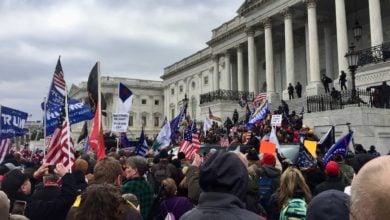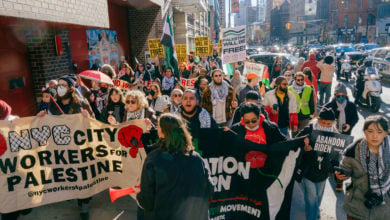This
article is based on a talk given at a PSL meeting in Los Angeles.
Class
war is being waged by all sectors of the capitalist billionaires
against working families. Workers increasingly cannot find jobs; they
cannot pay their medical bills or utility bills, nor buy food or make
their mortgage payments. Now capitalists have turned their guns on
grocery workers who are fighting for a fair contract.
The
battle began on October 11, 2003, when employees of Vons represented
by the United Food and Commercial Workers union went on strike
against cuts to workers’ health benefits which were paid for entirely
by the company; Vons wanted the workers to pay 50 percent of health
costs under a new contract. They also wanted to introduce a two-tier
wage system.
The
lower tier featured not only lower
base salaries, but also a reduction
in pay for
Sunday work from time and a half to time plus one dollar and
requiring a longer periods of employment before earning benefits.
Within hours, two other chains with contracts pending, Albertsons and
Ralphs, locked out their employees as well.
As
a result, for over four months, 70,000 union workers throughout
Southern California stood outside of stores and along streets to
picket and protest the corporations. Many customers also supported
the cause by honoring a boycott of the 900 stores on strike. With an
average of 75 percent of customers shopping elsewhere, the estimated
losses amounted to more than $2 billion for the companies but
nonetheless they succeeded in defeating the strike and imposing the
cuts.
Prior
to the 2003 grocery strike, about 94 percent of grocery workers had
some kind of healthcare. After the losses in 2004, only 54 percent of
grocery workers had any kind of health coverage and only 7 percent
had health coverage through the grocery companies.
The experiences of the grocery workers in 2003 have not been
forgotten and many grocery workers and organizers have cited these
experiences in recent demonstrations. In 2003,
many of the grocery workers had no experience with waging class war
but the months-long strike of that period served as a training ground
for the coming battles.
Current
struggle
The
UFCW contract expired in March. The workers – from the Vons, Ralphs
and Albertsons supermarkets – and their union have tentatively
settled on pension agreements. Recently, the most controversial
negotiations have been on the issue of healthcare. The employers want
the workers to pay a higher percentage for their healthcare benefits.
The
companies want workers to pay increased premiums, higher deductibles,
and a higher cap on health contributions. The total that a grocery
worker could be forced to pay under the bosses’ proposed plan would
be $11,196. This total includes an $8,000 maximum plus $2,000 premium
and $1,196 in deductibles. For grocery workers, who average about
$20,000 annually, paying half of their salary toward health costs is
outrageous.
Overall,
the companies are trying to shift about $500 million dollars worth of
healthcare costs onto the backs of workers. This is scandalous.
However, under capitalism, it is always in the interests of the
bosses to cut health benefits and pensions and reduce wages. They
will never willingly negotiate a contract that does not include some
kind of reduction. This is why organized workers must always be
prepared and willing to wage class war on the bosses—because the
bosses are always looking for some way to attack the workers.
Strike
authorization vote
The
grocery workers have recently voted to authorize a strike if
Albertsons, Ralphs, and Vons refuse to carry on negotiations in good
faith toward a fair contract. While this decision comes at a
difficult time—unemployment in California is hovering around 12
percent and the threat of potential scabs is a very real one—it is
important to note how recent developments in the workers’ struggle
in the United States have laid the foundation for a more protracted
and determined struggle in the event of a strike.
These
attacks have come at a time when the systemic failure of the
capitalist system has been exposed by the current economic crisis and
the criminal multi-trillion dollar bailout of the richest banks in
human history—a bailout that came directly from the deep empty
pockets of working families.
Locally
the solidarity demonstration with Wisconsin, organized by the Los
Angeles County Federation of Labor brought tens of thousands of
workers into the streets and forged renewed unity within the labor
movement as well as with other movements including the immigrant
rights movement. This unity was extended to May Day when thousands of
workers joined immigrants in demanding labor and immigrant rights as
well as an end to imperialist wars that continue to sap the U.S.
working class of badly needed funds.
These
developments have resulted in a great deal of solidarity in recent
actions for the grocery workers. The L.A. County Fed, representing
over 300 local unions, voted unanimously to support grocery workers
in the event of a strike. The umbrella organization of hundreds of
unions has already set aside over $100,000 in a strike fund to help
provide food to striking workers. In a recent press conference
regarding the looming strike, truck drivers, firefighters, teachers,
actors, and other workers pledged their support for grocery workers.
On
June 13, over 500 grocery workers and their allies, including the
ANSWER Coalition (Act Now to Stop War and End Racism) and the Party
for Socialism and Liberation, marched from a local Vons in Los Feliz
to an Albertsons in that same neighborhood. Members of the union and
other local community groups entered each store and demanded from the
bosses that they negotiate a fair contract with no cuts to health
benefits.
As
negotiations continued to be deadlocked through the month of June the
grocery workers organized a demonstration outside of the corporate
headquarters of Vons, Albertsons, and Ralphs that took place on June
28. Hundreds filled the streets outside of each headquarters in
Arcadia, Compton, and Fullerton, respectively. Grocery workers were
joined by SEIU, UHW, ILWU, Teamsters, IAM and the Black Worker
Center, as well as the ANSWER Coalition and the PSL. The
demonstrations over the past few weeks in June have truly reflected
working-class solidarity and are a promising sign for the coming
struggle.
As
the struggle continues to unfold, the PSL is preparing to play as
much of a role in the struggle as possible. We are already in the
running to “adopt a store” for the coming strike and will join
the struggle at as many picket lines and protests as possible
throughout Southern California. Our role as revolutionaries will be
to advance the struggle wherever possible and build the consciousness
of workers.
We
know that the real problem is not just the grocery bosses and this is
the message we must convey. The problem is capitalism. The problem is
a system of profit that cares nothing about the needs of working
people, the needs of the people who make our society run. The only
thing that the grocery bosses want is profit and expansion. They
claim that they cannot afford health benefits for grocery workers,
but the three grocery chains in question made a total of $5 billion
in profits in 2010 and paid out over $500 million in dividends on
Wall Street.
Clearly
there is plenty of money. The problem of capitalism is not
scarcity—it is distribution. Millions go to the owners as workers are
told to fight over the crumbs. But owners who produce nothing of
value and provide nothing of benefit to society deserve nothing. The
workers, including grocery workers, who make society run, deserve to
own and control all of the wealth they produce which is all of the
wealth of society.
Sisters
and brothers, as grocery workers and other organized workers in
Southern California prepare to wage class war we must also prepare to
wage class war with them, shoulder to shoulder. So prepare with us,
fight with us, and win with us.






